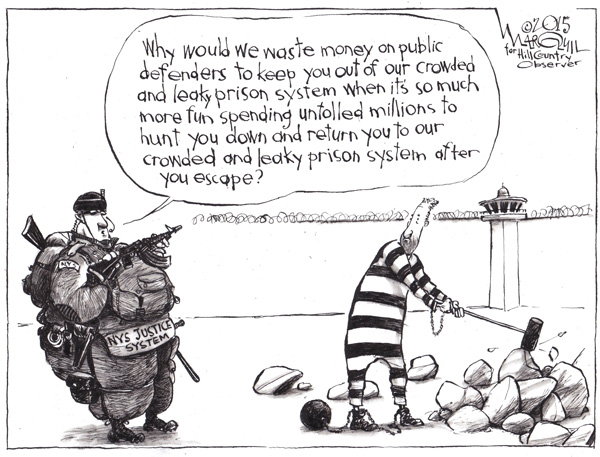Editorial July 2015
E D I T O R I A L
Fixing the failures of a legal system
Back in 2004, the first issue of this newspaper featured a story on Ansar Mahmood, a legal immigrant from Pakistan whose pursuit of the American dream was wrecked in part by bad legal advice.
Mahmood was in his early 20s when he came to the United States in 2000 and got a job as a pizza deliveryman in Columbia County, where he was awestruck by the natural beauty of the Hudson Valley. He sometimes asked strangers to take his picture in front of particularly scenic views so he could send photos back to his family in Pakistan.
One day he asked some workers at the water treatment plant in Hudson to take his photo in front of the city reservoir, which offers a sweeping view of the river valley and the Catskills beyond. It was about a month after the Sept. 11 terror attacks, and the city workers -- faced with this unusual request from a young man of Middle Eastern origin who spoke only broken English -- called the police.
Mahmood soon found himself being questioned by at least 10 state and federal law enforcement officers. There was nothing to link him to terrorism, but a search of his apartment revealed he’d cosigned a lease and registered a car for two friends from Pakistan who had overstayed their tourist visas. He was charged with illegal harboring of aliens.
After five days in jail, he finally got to meet his court-appointed lawyer, who advised him that the crime wasn’t that serious and that he should just plead guilty. The next day he did, and after returning to work for three months, he was sentenced to time served plus five years of probation.
What his lawyer failed to tell him, however, was that because of his immigration status, his conviction became grounds for mandatory deportation. So after his sentencing hearing, instead of being released, he was imprisoned for nearly three years at an immigration detention center near Buffalo and then sent back to Pakistan.
Mahmood’s case was a travesty of justice. But the notion that our legal system could deliver such a grotesque result would not surprise many people who have relied on court-appointed defense lawyers to handle what should have been comparatively minor run-ins with the law.
The U.S. Supreme Court long ago ruled that the Sixth Amendment guarantees a lawyer for all criminal defendants, regardless of whether they can afford one. But in too many jurisdictions, being represented by a public defender means one’s case is handled on the fly by an overworked and inexperienced lawyer. The results can be disastrous.
As our cover story this month details, the situation in New York state, where each county has its own system for providing public defense, has been particularly dysfunctional. In some counties, it’s common for lawyers to meet their clients for the first time in court.
Eight years ago, the New York Civil Liberties Union filed a class-action lawsuit demanding reform of the New York system, citing problems it documented in Washington County and four other counties around the state. It argued the counties’ public defenders often were so poorly prepared that they effectively provided no real legal defense.
Now the state has finally agreed to settle the lawsuit by providing new funding and oversight to help the counties upgrade the quality of legal representation they provide. The settlement won’t solve all of the problems of New York’s system – some are structural, like the state’s archaic system of more than 1,000 separate municipal courts – but it will go several steps in the direction that the Constitution and simple fairness require.


